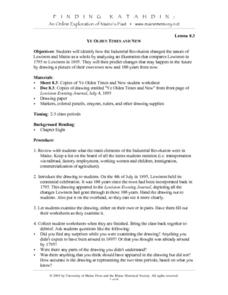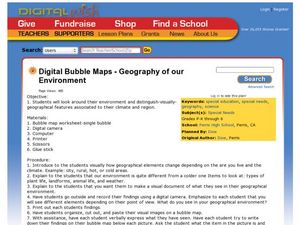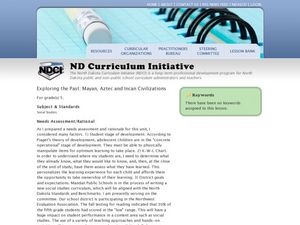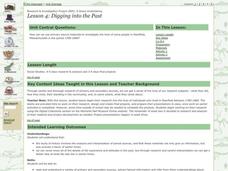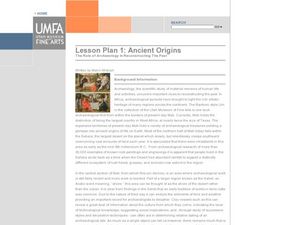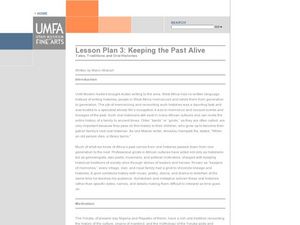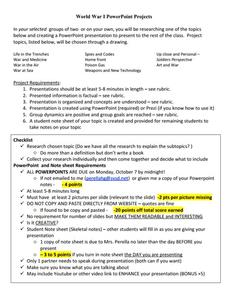Curated OER
Ye Olden Times And New
Students investigate the changes that occurred during the Industrial Revolution by comparing primary source documents from the Lewiston Evening Journal of 1895. They evaluate the document using a guided worksheet and discuss the changes...
Curated OER
Watching the Elections
Students analyze the media products and advertising techniques used in political campaigns. In this elections lesson, students view political debates and then work in groups to find examples of types of advertising techniques used in...
Curated OER
Empires of Early Africa
Ninth graders examine the Nile's role in the birth and growth of Egyptian civilization. In this World History lesson, 9th graders explore how archaeologists have learned about life in Ancient cities. Students present a report on their...
Curated OER
Whose Manifest Destiny?
Young scholars examine the Westward expansion. In this North American settlers lesson, students will view a PowerPoint presentation and answer critical thinking questions. Young scholars will write an essay that analyzes the impact of...
Curated OER
Geography of Our Environment
Students explore geographical elements. In this geographical elements instructional activity, students create a map showing the geographical elements in their area. Students take pictures of these elements to glue to their map and...
Curated OER
Entrepreneurs in History
Students examine the contributions of American entrepreneurs. In this industrialization lesson, students complete the provided handouts to determine how Vanderbilt, Carnegie, Hill, and Rockefeller impacted American society. Students...
Curated OER
Southern Literature
Study the literature of their region to make connections between the past and the present. Create and publish a regional magazine, which is filled with cultural events from the region.
Curated OER
Adventures in Archaeology
Expose your archaeologists to a variety of vocabulary words that deal with people who work in the fields of archeology, anthropology, and paleontology. Pictures accompany each of the slides so there is a visual associated with each...
Curated OER
Who Owns The Past?
Students research the validity and legality of ownership. Through the use of primary sources, web based and print media research, students become familiar with and evaluate the varying viewpoints regarding the...
Curated OER
Exploring the Past: Mayan, Aztec, and Incan Civilizations
Fifth graders research the Mayan, Aztec, and Incan Civilizations and identify contributions they made to modern society. In this ancient civilizations lesson plan, 5th graders look at maps of where they were located.
Curated OER
Philanthropists: Past, Present, Future
Students explore the concept of philanthropy. In this philanthropy lesson, students compare the work of antislavery activists to work of philanthropic activists today. Student implement a plan to share kindness with others.
Curated OER
Historical Fashions - Interdisciplinary Experience, Art & Social Studies
Seventh graders research styles, construction, fabrics, colors, and cost of Colonial era clothing. They create a life-sized model of themselves wearing Colonial period clothing and write a report about the clothes they designed.
Curated OER
Digging Into the Past
Eleventh graders research their subjects using a variety of sources and they develop a project to share their learning with their peers.
Curated OER
Ancient Origins: The Role of Archaeology in Reconstructing the Past
Young scholars read information about the ancient origins of art and archaeology with a focus on the Malian culture. For this art origins lesson, students read background information for the topic and compare ancient and contemporary...
Curated OER
Keeping the Past Alive
Students read about the oral histories of West Africa and complete related activities. In this oral histories lesson plan, students read about the importance of oral customs in African cultures. Students interview a family member about...
Curated OER
Detectives of the Past: Dr. Archaeology Travels Back in Time
Students watch a video and complete a webquest to gain a better understanding of the historical significance of the first known civilization, Mesopotamia.
Curated OER
Gladiators: Rome's Violent Past
Ninth graders examine the role of public entertainment in Ancient Rome. In this World History lesson, 9th graders imagine themselves as a participant at a gladiator game at the Roman Colosseum. Students write a personal account of the...
Seneca Valley School District
World War I PowerPoint Projects
Use these project guidelines as a start to designing your own class PowerPoint project and to consider what elements you would like to assign and assess in your class. While the resource begins with instructions for researching World War...
Curated OER
Geography, Energy, and the Twenty-First Century
Students examine the past and present effects of energy sources on geography in the 21st century. They compare/contrast energy consumption and production in the U.S. and the world, make predictions for future energy consumption, and...
Curated OER
Tall Grass Prairies of Arkansas
Students compare maps depicting the past and present range of tall grass prairie in Arkansas. They research to discover what has happened to the prairie, why it is unique, how it contributes to the biodiversity of Arkansas, and why...
Curated OER
People/Culture
Seventh graders explain both past and present examples of how people use of natural resources. They use the MVAC website to garther information about the prehistoric cultures in Wisconsin.
Curated OER
Political Parties Then & Now
Students research information about candidates both past and present. They role play a party member, the public or the press to present information.
Curated OER
Hispanics in Indianapolis
Eighth graders explore the history of the Indianapolis Hispanic Community and create an illustrated timeline of Hispanics in Indianapolis beginning from 1870 and ending in 1999, while exploring local social issues of the past and present.
Curated OER
Calling All Tribes
Young scholars inquire about past and present traditions and customs and formulate their own perspectives. They become actively involved in the studying process and explore the different aspects of the topic.


